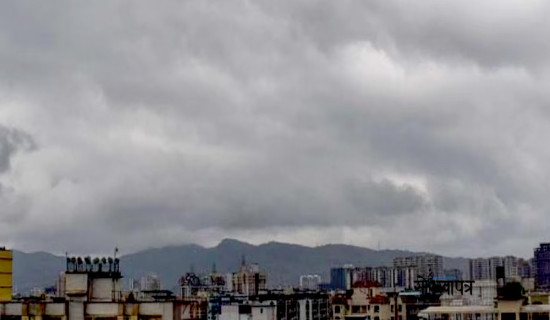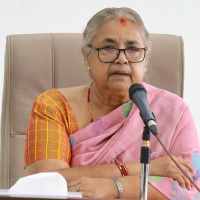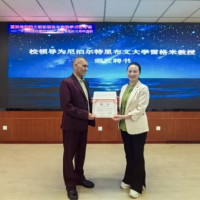- Wednesday, 29 October 2025
Madhes contributes to 77% of mango production
By Bijay Kumar Sah,Dhalkebar, June 20: Madhes Province is known as the capital of mangoes along with the grain storehouse. This province is also called the capital of mangoes because it produces the most mangoes in the country.
Mangoes, known as the king of fruits, are cultivated here commercially and traditionally. More than 40 varieties of mangoes, including bombay, maldaha, dashahari, krishna bhog and amrapali, are being cultivated here.
Some farmers here are planting various varieties of mangoes in big gardens and are producing them commercially, while some have been cultivating mangoes in the traditional way.
Secretary of Ministry of Land Management, Agriculture and Cooperatives of Madhesh Province, Dr. Umesh Dahal said that this province is fertile ground for mango cultivation. "The climate and soil here are suitable for mango production. This province contributes more than 77 per cent to mango production of the nation," he said.
Secretary Dahal said that although mangoes are cultivated in other parts of the country, Madhes Province is at the forefront in terms of commercial value and quantity.
According to the statistics of the ministry, mangoes are cultivated in an area of 42,773 hectares across the country and around 513,055 tonnes of mangoes are produced annually.
Of this, mangoes are cultivated in an area of 29,099 hectares in Madhes Province alone, from which 395,794 tonnes of mangoes are produced annually. According to the statistics, 77.1 per cent of mangoes are produced in this province.
Mangoes are cultivated commercially in eight districts of the province, including Saptari, Siraha, Dhanusha, Mahottari, Sarlahi, Rautahat, Bara and Parsa. Siraha is at the forefront in terms of mango production among the districts of Madhes Province.
According to the statistics, around 104,600 tonnes of mangoes are produced annually in Siraha, while 96,000 tronnes are produced in Saptari, 36,916 tonnes in Dhanusha, 32,722 tonnes in Mahottari and 39,118 tonnes in Sarlahi. Similarly, around 62,561 tonnes of mangoes are produced in Rautahat, 19,269 tonnes in Bara and 4,731 tonnes in Parsa.
President of Nepal Hotel and Tourism Entrepreneurs Association, Madhes Province Hira Gautam said that all three levels of government should emphasise on systematic marketing of local mango production.
He stressed on the need to promote dishes made from mangoes such as pickles and sukuti, and said that attention should now be focused on storing mangoes from local farmers to prevent the import of foreign mangoes.
He said, "As soon as the season ends in Nepal, there is a supply of expensive foreign mangoes in the market. This causes great harm to local farmers. If we can store the local produce, we can control the import of foreign mangoes to some extent. This will benefit local farmers a lot," said Gautam. He said that there is a great potential to connect Madhes with tourism through mangoes.
Minister for Land Management, Agriculture and Cooperatives of Madhes Province Janardan Singh Kshetri said that there is a plan to further expand the area of mango production in the coming year.
Stating that the Madhes government has been promoting it with the slogan 'Mango Garden, Prosperity of Madhes', he said that work is also being done on a long-term plan to produce various dishes from mangoes, such as pickles, powder and other dishes and supply them within and outside the country.
He said, "The Madhes government has a plan to make mango production more technology-friendly, modern and export-oriented. This will greatly contribute to the economic prosperity of this province."
Minister Kshetri said that plans have been taken forward to establish a processing centre, store the mangoes and export them to foreign countries under the provincial government's 'Mango Mission Programme'.









-original-thumb.jpg)







